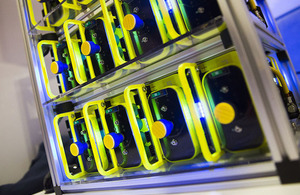Future electric vehicles: new Faraday battery challenge funding
The latest Industrial Strategy Challenge Fund opportunity is offering up to £25 million to UK businesses working on next-generation batteries.

The Faraday battery challenge will develop high-performance, lightweight batteries that are cost-effective, durable, safe and recyclable.
A £25 million funding competition will offer grants to innovative businesses with projects to develop batteries for future electric vehicles.
Funding is provided by UK Research and Innovation and delivered by Innovate UK.
A growing demand and global market
There is growing global demand for fully electric and zero emission vehicles, with the market estimated to be worth £5 billion in the UK and £50 billion in Europe by 2025.
The Faraday battery challenge is a £246 million investment to bring forward the next generation of electric vehicles. These will be powered by high-performance batteries that are cost-effective, lightweight, durable and safe, and can be recycled.
Clean tech start up, Brill Power is leading a project to receive funding under a previous Faraday battery challenge competition. Its battery control and management technology could extend the life of lithium-ion batteries by 60%, managing individual cells in a battery pack and allowing these to be replaced as needed.
ISCF winners. Faraday Battery Challenge - Brill Power
It is part of the Industrial Strategy Challenge Fund, which brings together the research base and businesses to tackle the biggest industrial and societal challenges.
This latest competition follows an announcement by the Prime Minister, Theresa May of an additional £106 million package for research and development in cleaner battery, vehicle and refuelling technology.
Scale up development and build the supply chain
This competition is to support business-led research and development to improve batteries for automotive applications.
There are 2 opportunities to apply, depending on the stage of your project, which are:
- up to £23 million for industrial research and development
- up to £2 million for feasibility studies
In both opportunities projects should aim to:
- make it easier to scale up battery production and use
- build the UK supply chain
Projects should address technical and commercial challenges, including:
- reducing costs at the cell and pack level, and minimising manufacturing costs
- increasing the energy density per cell
- increasing the power density per pack
- eliminating thermal runaway risks to enhance safety
- lengthening the cell and pack life in first-life applications
- broadening the temperature ranges that a pack can efficiently operate at
- creating new models to predict range and battery health
- improving recyclability, including design, reuse and recycling, towards 95% pack recyclability
Ideas that bring new investment and businesses to the UK and have the potential to increase productivity, competitiveness and growth are particularly encouraged.
Industrial research and development competition information
- the competition opens on 17 September 2018 and the deadline for applications is midday on 12 December 2018
- to lead a project you must be a UK-based business or research and technology organisation. You can collaborate with other businesses, academic organisations, charities, public sector or research and technology organisations
- projects can have total costs of between £500,000 and £15 million and last between 3 and 18 months
- businesses could get up to 70% of their eligible project costs
- if your application meets a quality threshold you will be invited to an interview panel between 4 to 12 February
- you can register to attend one of the briefing events taking place during September 2018 to find out more about the competition, how to make an application and meet potential partners
Feasibility studies competition information
- the competition opens on 17 September 2018 and the deadline for applications is midday on 12 December 2018
- to lead a project you must be a UK-based business or research and technology organisation. You can collaborate with other businesses, academic organisations, charities, public sector or research and technology organisations
- projects can have total costs of up to £500,000 and last between 3 and 12 months
- businesses could get up to 70% of their eligible project costs
- you can register to attend one of the briefing events taking place during September 2018 to find out more about the competition, how to make an application and meet potential partners